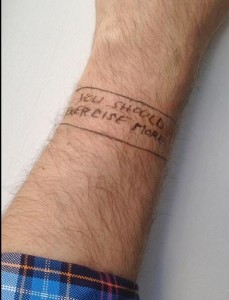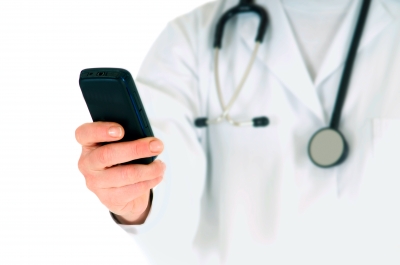November 17th, 2014 by Dr. Val Jones in News, Research
4 Comments »

A Cost Effective Fitness Band
In a new study published in the Annals of Internal Medicine, researchers found that overweight and obese patients who used a popular smart phone app (MyFitnessPal) did not lose significant weight after a 6 month trial period. The randomized controlled trial is the first of its kind to demonstrate that well-liked mobile apps may be ineffective for most users.
Two hundred and twelve racially diverse (73% female) patients treated at two UCLA primary care clinics were enrolled in the study. All indicated that they were interested in losing weight and 79% who completed the study indicated that they were “somewhat” or “completely” satisfied with the app, while 92% reported that they’d recommend it to a friend.
Unfortunately, as pleased as the subjects were with the app, there was no statistically significant difference in weight loss between the intervention and control groups. On average, the MyFitnessPal users lost 0.66 lbs in 6 months.
The authors note:
“Most participants rarely used the app after the first month of the study… Given these results it may not be worth a clinician’s time to prescribe MyFitnessPal to every overweight patient with a smart phone… Our analysis did not show any demographic covariates to be important predictors of app use.”
This study serves as a reminder that “popular” and “effective” do not always go hand-in-hand when it comes to weight loss interventions. While mHealth apps are expected to earn $26 billion by 2017, one is left to wonder if this money will be well spent or if we’ll all be “somewhat to completely satisfied” with the apps without anything medically significant to show for it?
December 27th, 2011 by BarbaraFicarraRN in Health Policy, Opinion
1 Comment »


Bill Crounse, MD, Senior Director, Worldwide Health, Worldwide Public Sector Microsoft Corporation shares his insights and describes four leading trends and technologies that will transform health and health care in 2012 and beyond.
These leading technologies include: cloud computing, health gaming, telehealth services and remote monitoring/mobile health.
Telehealth, Remote Monitoring, Mobile Health
I’d like to focus on telehealth and remote monitoring/mobile health since I feel telehealth is the nucleus of patient care, and telehealth can help reduce health care costs, and improve quality health care for patients. Telehealth technology combined mobile technology such as smartphones will make monitoring patients conditions easier and more efficient, and “cheaper and more scalable.”
Patient Quality Health Care
Through the Accountable Care Organizational Model (ACO), the core concept is to Read more »
*This blog post was originally published at Health in 30*
December 24th, 2011 by Felasfa Wodajo, M.D. in Interviews
No Comments »


Orca Health has had quite a year. Launching their first app in in 2010, they now have a suite of ten apps with–we are promised–even more on the way. By combining stellar art work, three-dimensional interactive graphics and high-end native programming for the iPad, they have created and may well be en route to cornering the market for perioperative patient education apps.
Recent milestones for the company include winning the startup competition at Health 2.0 Europe, having two apps, EyeDecide & FootDecide, included in the iTunes App Store’s Apps for Healthcare Professionals. Until recently, Orca Health’s EyeDecide was ranked as the #1 downloaded free medical app on the App Store, and three other other apps (FaceDecide, BreastDecide & ENTDecide) are in the Top 25. To top it off, the iTunes App Store just included EyeDecide among the best the iPad / iPhone apps in its App Store Rewind 2011. It is interesting to think about the different places, and there are many, they could go from here.
Orca Health was among those selected for the StartUp Mobile Health Pavilion at the recent mHealth Summit (check out our full coverage), along with about two dozen other great mobile healthcare companies. There, I got to meet CEO & founder Matt Berry and publicist whiz Jake Lybbert (follow on Twitter). I talked with Matt about the (short) history and future of Orca Health, and his thoughts on the potential for tablets to improve the patient experience.
First, I have to ask – why the name Orca? Read more »
*This blog post was originally published at iMedicalApps*
December 17th, 2011 by Felasfa Wodajo, M.D. in News
No Comments »


One of the major announcements at last week’s mHealth Summit was made by Qualcomm who introduced a new platform for wirelessly connecting medical devices. The 2net platform abstracts away the details of connecting a sensor to a cloud-based server.
Right now, if a company develops a great lightweight sensor to measure, say, walking speed, it will also have to engineer a way for that information to be transferred wirelessly, sometimes across a couple of stops, to its eventual destination somewhere on a server. Although these same challenges repeat for every device, each company has to “reinvent the wheel”.
Additionally, once it arrives at the company’s servers that rich collection of data would still be isolated – in a “data silo”. If another company comes along with a terrific heart rate sensor and suggests, “why don’t we combine the two data streams and make a useful new app”, not only would they have to recreate the entire chain of communication for themselves, the two companies would have to agree to methods for their two servers to talk and share information.
2Net makes almost all of the above problems Read more »
*This blog post was originally published at iMedicalApps*
December 6th, 2011 by iMedicalApps in News
1 Comment »


A recent report by ABI Research, providing a broad overview of the mHealth industry, predicts extraordinary grown in health and fitness apps over the next five years.
The report, Mobile Devices and mHealth, includes forecasts for the next five years on factors such as regional smartphone adoption rates, app downloads, and wearable device usage among others. One major conclusion from the report is that the sports and health mobile application market will grow to over $400 million in 2016 – up from just $120 million in 2010.
Mobile health devices recently received a major boost with the incorporation of Bluetooth 4.0, which is expected to spur the development and launch of devices that will take advantage of the lower energy consumption. While much interest is focused on blood glucose monitors, remote monitoring of cardiac rhythms, and other similar parameters, one conclusion of this report is that some of the most impressive growth will be in health and fitness apps that are more directly consumer-oriented.
The report itself, for a rather hefty price, also addresses other questions like Read more »
*This blog post was originally published at iMedicalApps*

















